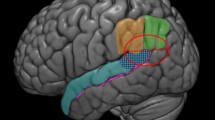Abstract
Developmental psychologists have been interested in the cognitive ability of perspective-taking for a number of years due to the apparent link between perspective-taking deficits and Autistic Spectrum Disorder. Most of the research in this area has employed the concepts and techniques of the approach commonly referred to as “Theory of Mind.” The current paper is concerned with an alternative operant account of perspective-taking based on a modern behavioral approach to human language and cognition called Relational Frame Theory. According to this approach, the relational frames of l-YOU, HERE-THERE, and NOW-THEN are central to the development of complex perspective-taking. The present paper reports 3 studies that investigate the development of perspective- taking in terms of these 3 relational frames. In Study 1, 5 age groups of participants ranging from early childhood to adulthood were exposed to a protocol assessing their abilities to respond to relational perspective-taking tasks. A developmental profile was then constructed from the relative performances of the different age groups on this protocol. The findings from Study 1 overall indicated that accuracy increased as a function of age. Studies 2 and 3 were subsequently conducted as controls. Specifically, Study 2 was employed to determine whether the low rates of accuracy recorded with the youngest group of participants in Study 1 was simply a function of the length of the statements contained within some of the tasks. The results from Study 2 suggested that this was not the case. In Study 3 an automated version of the protocol was employed to determine whether the high rates of accuracy recorded with the adult participants in Study 1 was a function of cueing. The results from this study similarly indicated that this was not the case. Overall, the findings from the 3 studies lend support to the Relational Frame approach to the development of perspective-taking as generalized operant behavior.
Similar content being viewed by others
References
BARNES-HOLMES, D., HAYES, S. C., & DYMOND, S. (2001). Self and self-directed rules. In S. C. Hayes, D. Barnes-Holmes, & B. T. Roche (Eds.), Relational frame theory: A post-Skinnerian account of human language and cognition. New York: Plenum.
BARNES-HOLMES, Y., BARNES-HOLMES, D., & CULLINAN, V. (2001). Education. In S. C. Hayes, D. Barnes-Holmes, & B. T. Roche (Eds.), Relational frame theory: A post-Skinnerian account of human language and cognition. New York: Plenum.
BARON-COHEN, S. (1995). Mindblindness: An essay on autism and theory of mind. Cambridge, MA: Bradford Books, Mit Press.
BARON-COHEN, S., & HAMMER, J. (1997). Parents of children with Asperger Syndrome: What is the cognitive phenotype? Journal of Cognitive Neuroscience, 9, 548–554.
BARON-COHEN, S., TAGER-FLUSBERG, H., & COHEN, D. (2000). Understanding other minds: Perspectives from developmental cognitive neuroscience (2nd ed.). Oxford: Oxford University Press.
HAYES, S. C. (1984). Making sense of spirituality. Behaviorism, 12, 99–110.
HAYES, S. C., BARNES-HOLMES, D., & ROCHE, B. (2001). Relational frame theory: A post-Skinnerian account of human language and cognition. New York: Plenum.
HOWLIN, P., BARON-COHEN, S., & HADWIN, J. (1999). Teaching children with autism to mind-read: A practical guide. Chichester England: Wiley.
PERNER, J., LANG, B., & STUMMER, S. (1998). Theory of mind and executive function: Which depends on which. Unpublished manuscript, University of Salzburg.
PIAGET, J. (1967). Six psychological studies. New York: Vintage.
Author information
Authors and Affiliations
Corresponding author
Additional information
We express our gratitude to Bill Dube and an anonymous reviewer for their encouraging and constructive comments on a revision of the manuscript.
Rights and permissions
About this article
Cite this article
McHugh, L., Barnes-Holmes, Y. & Barnes-Holmes, D. Perspective-Taking as Relational Responding: A Developmental Profile. Psychol Rec 54, 115–144 (2004). https://doi.org/10.1007/BF03395465
Published:
Issue Date:
DOI: https://doi.org/10.1007/BF03395465




